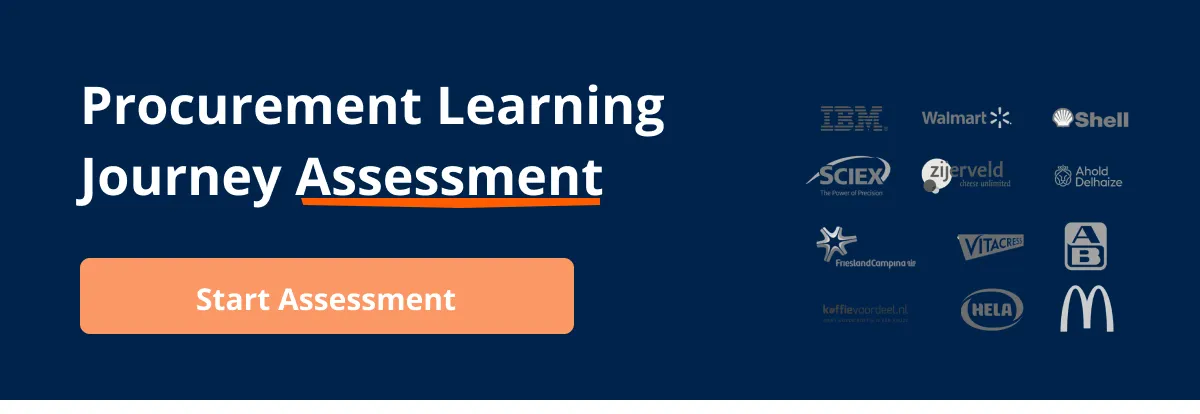ChatGPT & AI in
Procurement Course
Free Preview Lesson

Written by Marijn Overvest | Reviewed by Sjoerd Goedhart | Fact Checked by Ruud Emonds | Our editorial policy
Global Supply Chain — Everything About Supply Chain
Key take-aways
- To manufacture, distribute, and transport goods and services, businesses use a worldwide network and system called the global supply chain.
- Businesses can get resources and products from anywhere in the world using global supply networks.
- Global supply chains are complex systems that require strong management to operate optimally.
Global supply chain has become a popular way for businesses to source unique materials and products from other countries as they are unavailable domestically. However, what is it?
In this article, we will define what the global supply chain is. We will discuss why it is important and the benefits you can gain from the global supply chain. Additionally, we will tell you some tips on how to improve your global supply chain.
After reading this article, you will be able to grasp deeply what the global supply chain is. Thus, it will allow you to effectively implement the tips we shared with you in improving your global supply chain.
Defining Global Supply Chain
Global supply chain refers to the network of companies and resources involved in the production, distribution, and delivery of goods and services around the world.
To put it simply, it is the worldwide system that companies use to produce products or services. Global supply chains are networks that can extend across multiple countries and even continents, serving as channels for both supplying and sourcing goods or services.
These chains usually encompass the global movement of data, resources, and procedures. Organizations may also refer to them as global production networks or global value chains.
For instance, if an organization in Europe sources raw materials from India, manufactures the product in China, and sells it to customers in its country, then its supply chain is global.
Furthermore, a global supply chain can be complex and involve a wide range of stakeholders, including suppliers, transportation providers, regulatory agencies, and customers.
The use of advanced technologies and logistics strategies is often necessary to manage the complexity and risks associated with a global supply chain.
Why is it Important?
Global supply chains are important because they allow businesses to source materials and products from all over the world, allowing them to access a wider range of resources and reduce costs.
By using global supply chains, companies can also expand their markets and reach more customers around the world.
However, global supply chains also present challenges, including transportation, logistics, and regulatory issues.
For instance, the COVID-19 pandemic highlighted the vulnerabilities of global supply chains, with disruptions in the movement of goods and materials leading to shortages and delays.
Therefore, managing and adapting to global supply chains is important for businesses to remain competitive and resilient in an ever-changing global marketplace.
The Benefits of The Global Supply Chain
Here are some of the benefits of using a global supply chain:
1. Decrease costs
Companies can benefit from a global supply chain by accessing a wider range of resources and finding materials at lower prices.
Instead of importing labor and resources, they can outsource to countries where suppliers provide their services at a reduced cost.
This can help save on freight costs and shipping time, and enable companies to invest in areas that can improve efficiency.
2. Promotes innovation
Global supply chains can promote innovation in companies by bringing in new perspectives and ideas from different cultures, which can improve their business processes.
Such supply chains can also drive business growth by providing organizations with access to the latest technologies through collaborations with foreign firms.
As a result, they can explore new ways of conducting business, learn new production methods, and change their distribution systems.
3. Access to new customers
Global supply chains can help companies expand into new markets and reach international customers.
For instance, if a company has outposts in its supply chain across Asia, US, and Europe, it may find it easier to sell to those regions of the world.
Businesses often explore new locations by shipping to them, aiming to find untapped markets. Thus, allowing them to attract new customers and enhance sales.
Disadvantages of The Global Supply Chain
Here are some of the common risks related to global supply chain:
1. Complexity
Global supply chains are complex, involving numerous participants, resulting in increased costs and delays.
This intricacy stems from factors such as geographical distance, cultural differences, legal compliance, supply chain visibility challenges, and the impact of political and economic instability.
Successfully managing these complexities requires robust strategies and effective risk management measures.
2. Cultural and language barriers
Global supply chains include stakeholders from various countries, which can create language and cultural differences. These differences make communication challenging, leading to misunderstandings and inefficiencies.
3. High lead times and high shipping costs
You can make the most of production time, but it will take longer for goods to reach you because they need to be transported from different countries. This means you need to plan ahead.
Additionally, shipping costs can be expensive when dealing with global supply chains because goods have to travel long distances.
4. Losing control
When your suppliers are in different countries, it becomes challenging to handle the technical aspects of production, ensure good quality, and manage communication. As a result, it can lead to complications and problems with product quality.
5. Regulatory risks
Managing global supply chains requires adhering to various rules and regulations in different countries. This can be difficult and may lead to expensive fines and penalties.
Tips For Improving Your Global Supply Chain
Here are some tips that can enhance your organization’s global supply chain:
1. Conduct research
To build a global supply chain, it is important to select a suitable location for conducting business with ease.
This involves researching the logistical and geopolitical implications of setting up a production network in a specific country, and understanding the local laws, standards, and regulations for business expansion and outsourcing a product or service.
Additionally, companies should have an understanding of the culture of the region where they want to expand their business to avoid potential risks.
This may include learning about local holidays and weather patterns to avoid shipment delays and loss of goods.
2. Hire a professional overseas
To communicate easily with foreign suppliers, companies may hire an overseas representative who can remove language barriers and improve communication.
For instance, a business that purchases products or supplies from China may hire a local representative to manage contact with its supply chain.
Employing a bilingual representative can help interpret information accurately between both parties and prevent unexpected delays in the supply chain.
3. Build a strong relationship with your global suppliers
For you to strengthen your global supply chain, you can foster strong working relationships with your suppliers, which can encourage goodwill.
It is much better to communicate with suppliers through videoconferencing for face-to-face interaction, which may prevent misunderstandings.
Also, offering suppliers the flexibility to fulfill orders in specific periods may help build closer relationships and allow for negotiating favorable terms for the company.
4. Optimize your supply chain
Supply chain planning software can simplify managing suppliers, processes, and teams by streamlining workflow, reducing risks, and automating tasks to minimize human error.
Conclusion
The global supply chain is more than just a network of companies and resources involved in the production, distribution, and delivery of goods and services around the world. While it is a worldwide system that companies use to produce, distribute, and deliver goods and services, they are channels that encompass the global movement of data, resources, and procedures.
Moreover, rooting on the importance of supply chains, global supply chains are important because they are the gates that allow businesses to source materials and products from all over the world which also allows them access to a wider range of resources and reduces costs.
However, due to its wide range of opportunities and access, global supply chains are more complex to manage, production time is longer, and shipping can be expensive. Nonetheless, with a few solutions like hiring professionals overseas to manage everything and ultimately optimizing your supply chain, it will strengthen and improve your global supply chain.
Frequentlyasked questions
What is the global supply chain?
It is the worldwide system that companies use to produce products or services.
Why is it important?
It is important because it can help businesses access a wider audience, find materials at a lower cost, and promote innovation by gaining perspectives and ideas from different cultures.
How can companies manage risks in the global supply chain?
Businesses can manage risks in a global supply chain by conducting thorough research on the location and local regulations, understanding the culture of the region, fostering strong working relationships with suppliers, and utilizing supply chain planning software.
About the author
My name is Marijn Overvest, I’m the founder of Procurement Tactics. I have a deep passion for procurement, and I’ve upskilled over 200 procurement teams from all over the world. When I’m not working, I love running and cycling.


